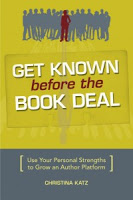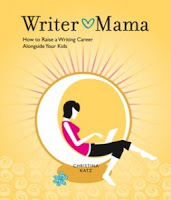Christina Katz is the author of Get Known Before the Book Deal, Use Your Personal Strengths to Grow an Author Platform and Writer Mama, How to Raise a Writing Career Alongside Your Kids for Writer’s Digest Books. She has written hundreds of articles for national, regional, and online publications, presents at literary and publishing events around the country, and is a monthly columnist for the Willamette Writer. Katz publishes a weekly e-zine, The Prosperous Writer, and hosts The Northwest Author Series. She holds an MFA in writing from Columbia College Chicago and a BA from Dartmouth College. A “gentle taskmaster” to her hundred or so students each year, Katz channels over a decade of professional writing experience into success strategies that help writers get on track and get published. Learn more at ChristinaKatz.com.
Christina Katz Platform Resolutions for Writers
Platform Resolutions for Writers 2010
Before writers establish an author platform, they typically establish a writer platform. Over the past decade, thousands of writers have parlayed established influence into traditional book deals. Landing a traditional book deal is still an effective way to exponentially increase your credibility and visibility.
Your “platform” refers to what you do in the world with your professional expertise that makes you visible and influential in the world. Having friends on Facebook or followers on Twitter is not your platform, unless the majority of those people know who you are, what you do, and are enthusiastic about your work.
I thought I would offer some advice about how to slowly and steadily establish a lasting platform. You may note the lack of fanaticism in this advice and the emphasis on enduring success instead. I’m a mother and a wife, a freelancer, a speaker, a teacher, and a blogger, so aiming for balance is the only way I can afford to work if I plan on sticking around for the long haul.
This advice has worked consistently for my students over the past several years. I think you will find that a grounded, step-by-step approach works just as well for you if you choose to follow it:
1. Develop a platform topic that you love and can work on tirelessly for the next few years. Your passion of the moment should come in second to the topic you could delve into deeply for a good, long time. Prior professional education and a depth of personal experience are going to be a boon to your platform if you have an eye on a future book deal.
2. Hang back from establishing a blog on your topic until you have cultivated a wealth of content and experience working with others on specialty-related activities that lend credibility and trust to your name. Others will tell you to start blogging immediately, but don’t, if you want to be efficient with your time and money.
3. Instead, gain authority by seeking publication in established, highly visible publications both in print and online that serve your target audience. Avoid the kind of publishing that anyone can accomplish, like posting on article sites, and work on your professional communication skills instead. By all means, avoid the content mills offering writers slave wages with the promise of future earnings.
4. Don’t begin any kind of marketing campaign for any product or service offerings until you have established yourself as a go-to person on your topic, again saving you time and money. Before you look at ways to serve others directly, channel your expertise into the best service methods possible based on your strengths and weaknesses. This is a meaty topic that is covered in-depth in my book, Get Known Before the Book Deal, Use Your Personal Strengths to Grow an Author Platform (Writer’s Digest Books 2008).
5. Then, develop a product or service that can become one of several multiple income streams over time that will support your goal of becoming a published author. For example, teaching classes over the years has allowed me to re-invest more of the money I earn from writing books back into book marketing. Make sure any offerings you produce are released conscientiously and are integrated into the professional writing you already do. Otherwise, you will seem like you are all over the place and just trying to score a buck.
6. Don’t expect your platform to support you financially for at least one or two years, as you micro-invest in it, re-invest in it as it grows, and expand your visibility.
7. Once you have a professional publication track record in your niche topic, then it’s time to hang your online shingle. I’ve seen this accomplished in as little as six months by exceptionally focused students. Take a portion of the money you’ve earned writing and invest it in a professional quality online presence.
8. A low-cost way to do this is to purchase your name as a URL and use a hosting site like GoDaddy.com to host a WordPress.org blog. I use the Thesis Theme, which you can see in action at my blog. In this way, a blog can also serve as your website where you post your published clips, offerings and bio. If you don’t have a ton of money to invest in the look of your site, you can always pay a designer later.
9. Delay partnering with others on joint ventures until you have a clear idea of your own strengths and weaknesses in and around your topic. And when you do partner with others be extremely discriminating. Make sure the partnership is going to be win-win-win for everyone involved.
10. Start an e-mail newsletter or e-zine with those who are most interested in your topic. Build your list by invitation and then grow it into a permission-based following over time. Create an expected, ongoing dialogue that is mutually beneficial to everyone involved and your list will grow.
11. Now you are ready to start blogging. And yes, I mean while you continue to do all the things we’ve already discussed. Be sure to zoom-focus your blog on what you have to add to the conversation that is already going on about your topic. Don’t just share information; make an impact. Make your blog a go-to, up-to-date resource for your audience.
12. Partner selectively with others who serve the same general audience that you do with integrity and humility. Spend time getting to know folks before you decide to partner with them. You can’t afford to taint the reputation you have worked so hard to establish by partnering with just anyone.
13. Now that you have an established niche and audience, definitely participate in social networking. I like Twitter, Facebook, and LinkedIn because they all offer something unique. The best way to learn is to jump in, spend an hour online each week until you are up and running. Follow the instructions for getting started provided by social media expert Meryl K. Evans.
This start-up plan for a writer platform will eventually blossom into an author platform. From start to finish, implementing a solid platform following this advice should take you about a year. By the end of that year, you will have established yourself as a serious contender in both professional and online circles, without killing yourself for some huckster’s promise of overnight success.
Have a plan. Leave a legacy in words, connections and professional influence. If you are consistent, by the time the year is done, you will have made effective use of your time and money in 2010. I wish you the best of luck in your platform-building efforts!
(Visited 23 times, 1 visits today)




These are excellent tips and I couldn't agree with you more! You have to know who you are before you can start building your platform. Sometimes it takes a while to get there but once you do, you'll know it. Great post!
Alyssa Ast
http://www.alyssaast.com